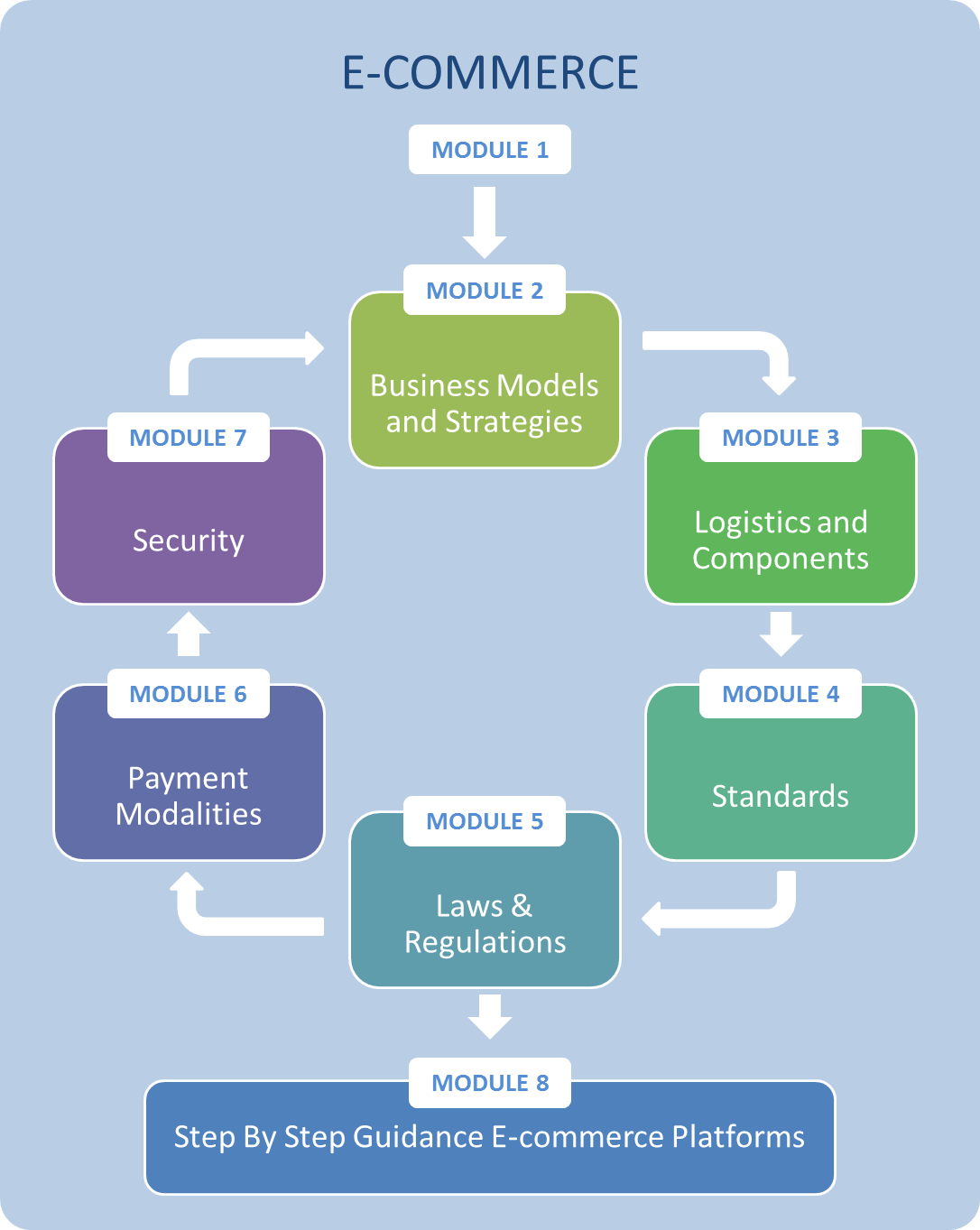E-Commerce
A facilitating guide for small and medium-sized enterprises (SME)
Global industrial stakeholders are applying innovative solutions such as the “Internet of Things” (IoT), cloud computing, artificial intelligence, Big Data and 3D printing which are enabling them to engage in are enabling them to participate in frontier industrial processes that are interoperable and flexible as well as introduce autonomy and intelligence to manufacturing. The physical components of industrial production are being transformed by smart, digital networking into cyber-physical systems (CPS), allowing for the management of production processes in real-time across great distances and customized products – all of which encompasses what is commonly referred to as the new industrial revolution.
E-commerce is a tremendous facilitator and component of this new revolution. This sector acts as a platform and link which allows manufacturers to integrate their customers into their business model in a direct and modern way. Global development of e-commerce has been progressing very rapidly with Business-to-Business (B2B) and Business-to-Consumer (B2C) e-commerce facilitating and catalyzing this growth.
This training course has been designed to provide a strong foundation on the basics of e-commerce, which aims to promote increased e-commerce adoption among SMEs. The training modules have been designed in a way that other target stakeholders such as policymakers, NGOs and consumers can benefit from the content. UNIDO encourages participants to connect with e-commerce platforms to enhance the performance of their business and commercial activities.

Module 1: Introduction to E-commerce
This module has been designed with the intent of providing a comprehensive overview of e-commerce and its current status in the BRICS countries. By the end of the module participants should be able to:
- Define and understand the various interpretations of e-commerce
- Understand the difference between e and traditional commerce
- Outline the benefits of e-commerce for different stakeholders
- Understand the basic principles of established e-commerce models
- Become aware of the latest e-commerce developments, trends and barriers in the BRICS
Module 2: E-commerce Business Models and Strategies
This module has been designed with the intent of providing a overview of the established e-commerce business models and web-based strategies used by e-commerce stakeholders. By the end of the module, participants should be able to gain an understanding of the following:
- B2B e-commerce
- B2C e-commerce
- C2C e-commerce
- B2G e-commerce
- Mobile e-commerce
- Reverse Auctions
- Webpage-Design Strategies
- Types of e-commerce stakeholders
Module 3: E-commerce Logisitical Components and Considerations
This module has been designed with the intent of providing a comprehensive overview the various components that comprise the e-commerce sector. By the end of the module, participants should be able to gain an understanding of the following:
- The Internet
- Supply Chain Management
- Warehouse Operations
- Client Relationship Management
- Digital Marketing
- Shipping
- Disputes
- Returns
- Cross Border Logistic Considerations
Module 4: Standards and E-commerce
This module introduces the concept of standardization as a component of Quality Infrastructure system. By the end of the module, participants should be able to:
- Define what a standard is and distinguish the different types of standards
- Understand what do standards do and outline their benefits for different categories of stakeholders
- Understand the relevance of standards for international trade, in the framework of the WTO
- Understand the opportunities and challenges related to standards for developing countries
Module 5: E-commerce Laws and Regulations
This module has been designed with the intent of providing a comprehensive overview e-commerce laws and regulations. By the end of the module, participants should be able to gain an understanding of the following:
- From a Government/Policymaker Perspective:
- E-signatures
- Consumer Protection
- Data Protection and Online Privacy
- Cyber Crime
- From a SME Perspective, answers to Frequently Asked Legal Questions (FALQ) on Cross-Border E-commerce
Module 6: E-commerce Payment Modalities
This module has been designed with the intent of providing a overview of the popular e-commerce payment modalities. By the end of the module, participants should be able to gain an understanding of the following:
- Card Payments
- Digital Wallets
- Mobile Wallets/Mobile Payments
- SWOT analysis of Digital and Mobile Wallets
Module 7: E-commerce Threats and Security
This module has been designed with the intent of providing a overview of e-commerce threats and recommended security measures to counter these obstacles. By the end of the module, participants should be able to gain an understanding of the following:
- E-commerce Threats
- Client Threats
- Communication Channel Threats
- Server Threats
- Mobile Payment Threats
- General Security Recommendations
Module 8: Step by Step Guidance E-commerce Platforms
This module has been designed with the intent of providing a general step-by-step concept on how to use e-commerce platforms.
By the end of the module, participants should have a basic idea on the following:
- How to register themselves/their businesses on various platforms.
- Gain general information on e-payment on e-commerce platforms
- Understand how manage their orders on platforms
- Comprehend aftersales mechanism that e-commerce platforms offers
This module has been designed with the perspective of identifying mechanisms which are common among various e-commerce platforms.
